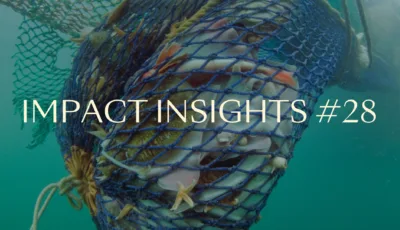Impact Insights #13
Get ready for the 13th edition of Norselab's Impact Insights, curated by Norselab's Impact Analyst, Chris.
■ The EU law on due diligence in value chains blocked last-minute
The adoption of the Corporate Sustainability Due Diligence Directive (CSDDD), after being provisionally approved by the EU Parliament two months ago, has been put on hold. At the last minute, the adoption of the law was taken off the agenda as Germany and Italy indicated they would not back the law. They argue bureaucratic burden on corporations would become too large. The adoption of the CSDDD, designed to bolster environmental and human rights protection within the EU and across EUs global supply chains, would impose obligations on large companies to assess and address potential adverse impacts on human rights and the environment across their operations, subsidiaries, and business partners. The sudden lack of a 65% support for the new rule, as Germany and Italy step back, means that the adoption of the directive might be delayed until after summer.
■ EU commits to restore 72% of European natural habitats by 2050
During the final days of February, the EU adopted its first-ever law on the restoration of degraded ecosystems, an answer to the commitment made during COP 15 in 2022 to protect and restore 30% of the world’s degraded ecosystems by 2030. The EU Nature Restoration Law aims to restore 20% of habitats in a poor state by 2030, with the aim to restore an impressive 90% of these habitats by 2050. The EU estimates that 81% of European habitats are in poor shape and that for every euro invested in the restoration of these natural habitats, society will reap benefits worth €4-€38. This would mean around 72% of all European habitats would see an improvement in ecosystem health, resilience and biodiversity in the coming decades, making this law a true cornerstone of EU’s biodiversity strategy.
■ New report estimates demise of Norwegian gas industry around the corner
A new report published by the WWF, Greenpeace and various research institutes finds that current and projected EU energy policy could lead to a full stop in imports of Norwegian oil and gas by 2035. In response to the Russian invasion of Ukraine in 2022, the EU has completely revised its Energy policy. With their new REPowerEU strategy, the EU will attempt to completely phase out reliance on Russian fossil gas imports by 2027, through large-scale investments in energy efficiency and renewable energy capacity. The report deems this policy to be pivotal in the growing disalignment between Norwegian fossil expansion and EU demand projections. The report highlights that EU natural gas demand is in a structural decline with Norwegian export capacity likely exceeding demand by 2035. Moreover, if the EU follows through on their net-zero commitments, domestic EU gas production is likely to exceed all gas demand by the 2030s.
■ The war on ESG considerations in the US
The US anti-ESG movement seems to be gaining ground. Several large US fund managers recently announced their withdrawal from a climate-related initiative in response to increasing scrutiny. Since 2022, the political US has been in continuous debate about the place of ESG in the financial industry. In 2023 alone, over a 165 anti-ESG bills were passed by republican states, in an effort to restrict asset managers in the freedom to consider investments’ ESG impacts. While some might argue that this is the downfall of sustainable finance, other asset managers, like BlackRock who recently announced the end of their ESG investment approach, say the end of ESG is the start of something new. “Transition investing”, as BlackRock has named this new era of sustainable finance, recognizes a move away from “ESG” and the outdated attempt to treat all impacts as one. BlackRock’s Transition investing, will now focus on taking on investments in spaces like renewables, where strong real-world impact is combined with high commercial value. The clear denouncement of ESG-ambiguity and marketing mindsets indicates a necessary paradigm shift is underway in the financial industry. A shift that might just pave the way for impact investing as the dominant strategy in sustainable finance.


